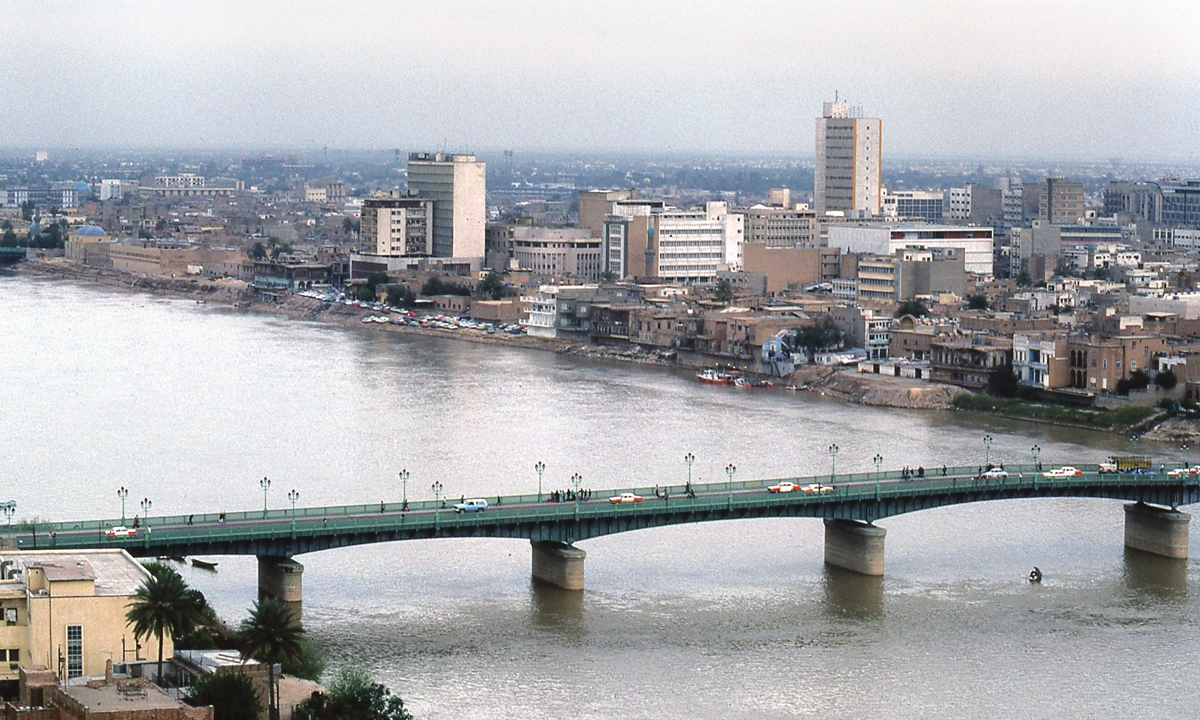
Cars and pedestrians cross a bridge spanning the Tigris river in the Iraqi capital city of Baghdad. Photo: VCG
Traditional wooden boats, which used to be part of the classic sceneries along the Tigris River in the Iraqi capital of Baghdad, are disappearing, while boat craftsmen and owners are struggling to preserve this heritage as more modern boats sprout up.
"The wooden boat industry has almost disappeared. There are very few wooden boat makers now," Abbas Abdul-Kareem, 42, told the Xinhua News Agency with a bitter smile in the al-Kareimat neighborhood, one of the oldest urban areas located in central Baghdad.
"My father and grandfathers used to build wooden boats, and many other workshops spread on both sides of the river here, but a few decades ago, this profession began to [be] gradually extinct," Abdul-Kareem said.
Abdul-Kareem explained that the decline of the wooden boat industry is linked to the rise in wood prices, especially the type used in boat building, in addition to the emergence of modern boats made of fiberglass, which are lighter and cheaper.
He complained about the lack of governmental support to save the country's heritage since the 1990s, partially caused by the 2003 US-led invasion and the chaos and violence that followed.
Recalling the good old days of the wooden boats, Abdul-Kareem said there was a famous family in the trade, the al-Rawak family, which owned the largest wooden boat workshop in Baghdad.
The family gradually faced great difficulties due to the high price of wood and the stagnation of the industry, and was forced to leave Baghdad to the city of Samarra, some 120 kilometers north of the capital, as the wooden boats are still desired by residents there.
A fisherman in his 70s, Abu Bilal still works in his wooden boat, which is one of the few left on the river.
He told Xinhua that he bought his boat 25 years ago, and he insists on repairing it by himself now that most of the workshops have disappeared from the region.
"The prices of the boats increased between 3.5 to 4 million Iraqi dinars [$2,300 to 2,700], so people turned to the well-priced fiberglass [boats], which cost about 1.6 to 1.7 million dinars," Abu Bilal told Xinhua while cleaning his fishing net on the bank of the river.
People are increasingly preferring fiberglass boats, not only because fiberglass is cheaper but also lighter and easier to maintain, Abu Bilal explained.
In some way, the disappearance of wooden boats is related to today's lifestyle, which differs from that of previous decades when wooden boats were commonly used for fishing in the river, said the old man.
The name of Mesopotamia (Land between the rivers) is associated with two great rivers: The Tigris and Euphrates, which form the fertile sedimentary plain of Iraq. Under such a geographical situation, the need arose early for boats to cross the rivers scattered across the land.
Daham al-Saadi, a history professor at the al-Iraqia University in Baghdad, told Xinhua that archaeological evidence shows that the ancient Iraqis used boats made of reeds 5,000 years ago, which evolved throughout history to boats made of wood.
"It indicates that the profession of building wooden boats was linked to the history of Iraq, but today it faces the danger of extinction, although some of its makers in Baghdad and other cities in Iraq are still trying to preserve this heritage industry," said al-Saadi.
"The number of wooden boats is decreasing day after day," Al-Saadi said, calling for the government to protect the heritage by supporting the industry as an indispensable part of preserving the history of Iraq.




